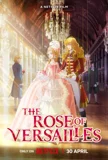https://youtu.be/MXmGxRfC014 [Play]
Earlier this year, the release of the 2025 "The Rose of Versailles" adaptation hit theater screens in Japan after several years of production.
On April 30, the film was distributed globally by Netflix, replete with dubs in multiple languages. In this thread we will discuss this release, our views on the work, and any other relevant applicable commentary.
Console:
X
CLEAR CONSOLE
/a/ - Anime & Manga
1079238-e...jpg

(975.92 KB
940x1392
)

Not even a link where to watch it?
nyaa-6336...png

(7.76 KB
1157x93
)

>>660
https://nyaa.si/view/1966295
https://nyaa.si/view/1219637
Someone said it was very rushed in the comments I wonder if I should probably try watching the original series before watching the movie...
ROV_film_...jpg

(192.05 KB
1200x900
)

Forgive my delay, as I did not write the following until after creating this thread. I have much to say about the work.
Overview & Introduction
As a relatively new but passionate fan of the original Rose of Versailles TV Anime, I was incredibly eager to see this film. The work is sacred in many ways, not only to me but to fans all over the world, as it is one of such cultural significance that the original creator received official recognition from the French government for her contributions to the international proliferation of French history and culture through interest generated by the work amongst Japanese audience, and then later audiences elsewhere.
For those who do not know, The Rose of Versailles is an adaptation of the life of Marie Antionette during her time as Dauphine and then Queen of France. Juxtaposed alongside her is a fictional character named Oscar Francois, a woman raised by her father to be the son he never had with the expectation that she would serve the military and royal family in his footsteps. The author chose to make Oscar a woman because she felt she could not capture a man's heart accurately, instead opting to put a woman in a man's shoes despite the conventions of the time. The story itself broadly a story about the hearts of women, and the hardships of balancing their womanhood (or rejection of it) within their individual places within society. Oscar would go on to be a tremendous influence on numerous other works, including characters such as Griffith in Berserk, Charlotte in Samurai Showdown, and even Hot Pants in Jojo's Bizarre Adventure.
All of those many words to say, The Rose of Versailles is arguably one of the most important works of manga / anime to ever be made in the scope of real-world impact and influence beyond the pages of a comic book.
First Impressions
As for this film, I will speak first about my experience in Japan earlier this year as the film's marketing was in full swing. Aside from television ads, there were many unique collaborations, ranging from themed cafes to pop-up shops to a train-line stamp rally in Tokyo. It was clear the work would at the very least not go unseen. This said, the marketing showcased a number of significant moments from the work that are recognizable to fans at a glance.
While I was indeed quite happy to see VerBara getting due recognition in 2025, I had very, very strong reservations after seeing the first trailer for the film back in 2024. The likeness of the characters felt a little off for me in some cases (and hugely off in others) though this may be because I am a TV anime fan rather than manga reader. Far more significant to me was the presence of the main theme of the film. While the original TV Anime featured what I would consider to be an absolutely incredible soundtrack that exuded the attitude of anime in the late 70s and captured the spirit of the work, this gospel-adjacent composition for the new film was jarring in a way that I found tremendously out of place.
The original work is based on the real-world sunsetting of the French Bourbon Dynasty, leading into the French Revolution. That said, the use of English lyrics amidst Japanese rather than French seemed tremendously inappropriate. I am not in any way a French person, but it simply feels wrong. Stylistically, I also feel it does not capture the spirit of the work beyond some of the early, lighter moments from the start of the story, if I had to somehow justify anything that makes it appropriate.
All the same, the website for the film featured many fun little diversions, including custom image makers and overviews. As additional marketing materials were released, I awaited the film with tempered expectations.
Film Impressions
On May 2, I finally sat down to watch the film on Netflix. The viewing party decided upon the Japanese dub, though I was personally more interested in French for authenticity.
Within the first handful of moments, it was established that this film would feature no shortage of "dazzling" visual effects that seemed more appropriate for an otoMAD production based on a production than the film itself. The other thing that was very evident was that the visual presentation of each scene also felt something akin to a stage production in a way comparable to a theater or even a game like Paper Mario or Danganronpa, with 2D characters and set-pieces cast atop 3D assets. The blend of 2D and 3D is not uncommon for Studio MAPPA, who handled this production.
After the first several scenes it was also clear that the film would be more loosely compared to a series of iconic "snapshots" from the original work, which makes sense given the sheer volume of content that needed to somehow fit into the theatrical runtime. The presentation of these elements were thoroughly jarring at times, something that felt like whiplash from time to time, but they were also visually very interesting to look at.
Something that happened more often than I expected was the sudden breakout into song to summarize the feelings of the various cast members. In the opening of the film I thought to myself it felt similar to the opening number of a musical. After the fourth or fifth time it happened, I realized this was the secret intention of the anime film— actually attempting to be a musical.
This revelation came to me in waves, a tinge of denial before I finally accepted it truly was the case. I have never seen this done before, and in the wake of this revelation, I felt... dismay.
There is nothing wrong with being a musical, and the format is already well adapted in its long-running all-women stage show in Japan, but to see an anime attempting to be an actual musical was incredibly jarring. Hugely jarring. I could not believe what I was seeing. Putting that aside, there is nothing inherently wrong with breaking out into a sudden musical number, but doing so demands that the quality of the music actually be worth listening to. To this end, it brings us back to the original criticism about the main theme of the film- the music is just strange and very out of place and, frankly, just not good of substantial enough quality to honor the context in which in appears.
Recall earlier, the TV Anime had a notable soundtrack of substance. It is the sort of music that sticks with the listener. From somber vocals to beautiful instrumentation, there's much to celebrate. By contrast, the 2025 film has incredibly unremarkable music— perhaps remarkable only for how unremarkable it is. This is obviously a huge issue when the work is attempting to be a musical itself.
The production pivots into a more formal cadence once the flames of revolution become more present in the story. At this point, the story also focuses more on Oscar's plot rather than the shared plot of Oscar and Marie Antionette. To this end, the first half of the film is more about the latter, and the second half, the former. Both characters are referred to as roses within the broader context of the story, making this a film about the two of them and their respective love interests.
Either way, by the end of the film, I got the impression that the production team was trying to make Rose of Versailles into Les Mise-rose de Versaille. The difference is, Les Mis has actually got memorable music to help paint the picture and tell its story. Critical scenes from the work are sped over, only to waste time on drawn out musical numbers that fail to land, both because of their composition and lyrical qualities.
As the film pressed on, I felt no few times that I was watching out of obligation, eager for it to be over. By the final act, the quality seemed to pick up overall, and I couldn't help but feel that it had more than one director calling the shots because of how distinctly different the first and second acts felt in both style and substance.
To conclude, the entirety of this film could be called just that— a case of style over substance. The depth and substance of the original work is the sort that has made it a lasting piece of Japanese cultural media for decades. That begs the question as to why the production team instead leaned entirely into style. It felt shallow, without many of the necessary elements that made it so memorable in the first place.
I would consider calling this work a case of "fan-service" but do not believe it will be creating any new fans. No few times did I ask "What the hell am I watching!?" and sadly, it was only in the conclusion of the work that some of those feelings dampened enough to say farewell.
Au revoir, Oscar Francois. May your next appearance in the stage be one worthy of your dignity.
ばらは、ばらは...美しく散る。
>>661
>I wonder if I should probably try watching the original series before watching the movie...
I highly encourage you to watch the original or read the manga before watching this film. It is not a work for new fans. It has also, interestingly, caused a massive fissure in the Rose of Versailles otaku scene within Japan, with manga readers liking it far more than anime viewers.
Of course, every adaptation also takes considerable liberties, so tread accordingly. The TV Anime is much more focused on Oscar, whereas the original work is a case of Marie Antionette → Oscar. This has its own pros and cons. I like the anime very much. I have not finished the manga.
I'm 7 episodes into watching the TV series. A lot of it reminds me of Legend of the Galactic Heroes but with court intrigue and scheming concubines, except stuff actually happens unlike that big nothing-burger of a show. Given the subject matter I don't think its a surprise that it got adapted by Netflix.
>>664
If I understand correctly, Netflix did not handle the adaptation, they are only the worldwide distributors of the film.
As for your summation, yes. You are correct. Unlike in fiction, there is no need to contrive such controversies because the events in the work are based on the actual history of the French courts, even if dramatized. The series does a phenomenal job at portraying these controversies interestingly while also making Oscar a meaningful observer and, at times, participant.
There is good reason I was so eager for the film, despite my reservations. The entirety of the court intrigue is sadly cut from the film, aside from the romance plotlines. I hope you will enjoy the series as much as I did. It is a rare case of something that captivated me entirely, with apprehension knowing that it was coming to an end with each step. Few series do so good of a job at bringing the viewer along for the life of a character in such a way that is actually well executed.
>>665
>As for your summation, yes. You are correct. Unlike in fiction, there is no need to contrive such controversies because the events in the work are based on the actual history of the French courts, even if dramatized. The series does a phenomenal job at portraying these controversies interestingly while also making Oscar a meaningful observer and, at times, participant.
My point was not about the show being contrived or fictional... I was comparing RoV's pacing and drama to LOGH which drags and doesn't capitalize on its potential, especially when we're talking about fiction where there's no limit to what you can do (it's a piece of shit and I don't care what anyone says otherwise). Yet in RoV it feels like something important is happening in every single episode as in it does not like to drag on filler. Even if some events might be made up that’s not a bad thing at all -> If I wanted to watch a documentary I'd do that instead. Because with this medium I'd rather watch something like Amadeus where the history's exaggerated because it becomes a performance... same way Mozart composed to stir emotions, hold attention, and leave impact not to follow rules or chase accuracy.
I am 19 episodes in and it's a kind of emotional rollercoaster which I thought would maybe stagnate at some point but it's the complete opposite. Every episode just keeps getting better and I want to watch more and more. Every episode tries to progress the story forward and forward there's no time to waste and a lot of things to be said and shown like watching a never ending movie. A commonly overused phrase but I would say this anime feels like it truly was ahead of its time, especially in how Oscar is portrayed as a woman raised as a man, commanding respect and romantic admiration from both genders. It's the kind of character you sometimes see in anime that came after it, which probably drew inspiration from this one originally(?)
Also, I know it's historical, but I really don't like how the narrator sometimes just spoils things and keeps reminding you of what's going to happen in the future, like Madame de Polignac influencing all decisions of Marie Antoinette for the next 10 years as though she was ruling from the shadows, and you're told this just as you're being introduced to her.
I have decided to watch the film again in English language, curious of the voice cast performance in my native language. I find it more palatable this time, though I wonder if it is because i have already seen it that I cannot be disappointed.
So far I am not displeased. The performances are not bad at all. Some feel quite good, others feel acceptable. Oscar's voice sounds a bit too high pitched to me, but the actual acting feels right. I much prefer that to the inverse.
The actual "musical" part of it is more tolerable in English. I find Fersen sounds much better when not singing, because his singing voice is dramatically different when singing.
The extras do not sound great.
I believe for the purposes of a formal dub of this work, it would be better to have English accents because of their analogous place during the French Revolution. There is a certain air that you hear in works that reflect the American Revolutionary era of speech. I suppose by that I mean Shakespearean flavor English, at least in the timbre and tone of accent work.
>>671
I remember routinely feeling a trepidation over the series coming to an end. The first half is arguably stronger with both intrigue and pacing being more well structured. The final episode feels almost unreal in a way that is comparable to the budgetary issues from Evangelion's final episode.
I hope to hear your thoughts once it's all over.
>>672
That entire sequence was harrowing. What a great show.




